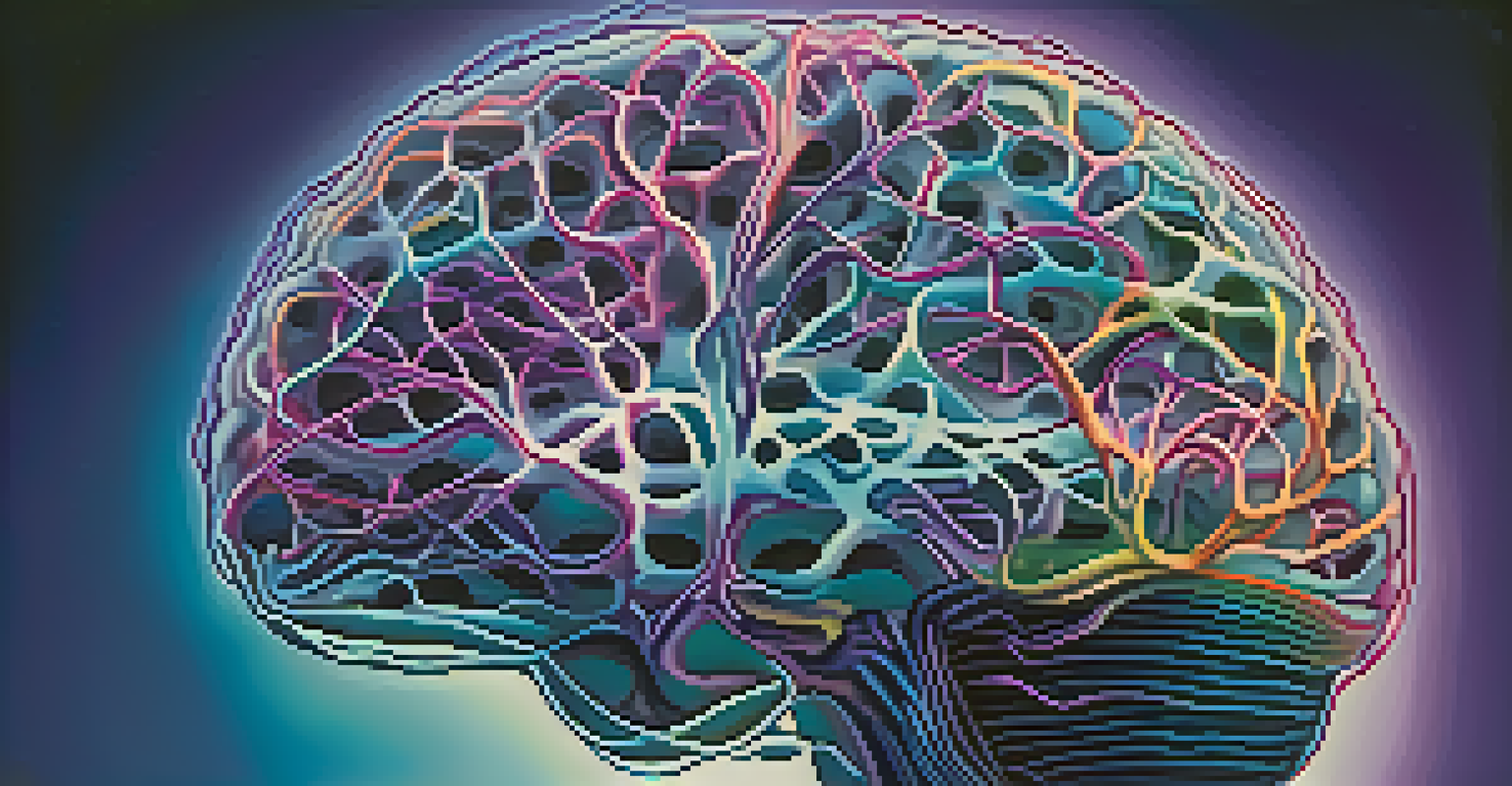Exploring the Role of Hallucinogens in Mental Health Therapy

Understanding Hallucinogens and Their Effects
Hallucinogens are substances that alter perception, mood, and cognitive processes. Common examples include psilocybin, the active compound in magic mushrooms, and LSD. These substances can create profound changes in an individual's sensory experiences and thought patterns, often leading to what some describe as mystical or spiritual experiences.
Psychedelics can help us to see ourselves and our world more clearly, and it can also help us to experience things that we wouldn't normally experience in our everyday lives.
While hallucinogens have been used for centuries in various cultural rituals, modern science is beginning to explore their potential therapeutic benefits. Researchers are particularly interested in how these substances might help treat conditions like depression, anxiety, and PTSD. Understanding their effects on the brain is crucial in evaluating their role in mental health therapy.
It's important to note that not all hallucinogens are the same, and their effects can vary widely between individuals. Factors such as dosage, setting, and personal psychology play significant roles in the outcomes of hallucinogenic experiences. This variability underscores the need for careful research and controlled environments when considering their therapeutic use.
Historical Context of Hallucinogens in Therapy
The use of hallucinogens in therapy isn't a new concept; it dates back to ancient civilizations that utilized these substances for healing and spiritual purposes. Indigenous cultures often incorporated plants like peyote and ayahuasca into their rituals, believing they held the keys to mental and spiritual wellness. Despite their long history, mainstream medicine largely overlooked these practices until recent years.

In the mid-20th century, researchers began to study the effects of substances like LSD and psilocybin on mental health. Some early studies showed promising results, indicating that these compounds could help alleviate symptoms of anxiety and depression. However, due to a combination of social stigma and regulatory restrictions, research into their therapeutic potential waned for several decades.
Hallucinogens Alter Perception
Hallucinogens like psilocybin and LSD can profoundly change sensory experiences and thought patterns, leading to potential therapeutic benefits.
Today, there's a resurgence of interest in hallucinogens, driven by both scientific curiosity and a growing recognition of the limitations of traditional psychiatric medications. This renewed focus aims to better understand how these substances can safely and effectively contribute to mental health treatment.
Current Research on Hallucinogens and Mental Health
Recent studies have reignited discussions about the therapeutic potential of hallucinogens, particularly in controlled environments. Research institutions are conducting clinical trials to explore how substances like psilocybin can effectively treat conditions such as depression, anxiety, and substance use disorders. Early results are promising, suggesting that these substances may facilitate profound psychological breakthroughs.
The greatest discovery of my generation is that a human being can alter his life by altering his attitudes.
For instance, a study conducted by Johns Hopkins University demonstrated that psilocybin could significantly reduce symptoms of depression in patients who had not responded to traditional treatments. Participants reported lasting effects, with some experiencing a shift in their perspective and a renewed sense of hope. These findings are encouraging and suggest that hallucinogens could serve as a valuable addition to mental health therapy.
However, it's crucial to approach this research with caution. The therapeutic use of hallucinogens requires a controlled, supportive environment, and trained professionals to guide the experience. This ensures that individuals can navigate their emotional responses safely and effectively.
Mechanisms of Action: How Hallucinogens Work
Hallucinogens primarily affect serotonin receptors in the brain, particularly the 5-HT2A receptor. This interaction alters neurotransmitter activity, leading to changes in mood, perception, and cognition. The resulting altered state of consciousness can help individuals confront and process deep-seated emotions and traumas, potentially paving the way for healing.
One theory suggests that hallucinogens can disrupt rigid thought patterns, allowing for greater emotional flexibility. This shift may enable individuals to view their problems from new perspectives, ultimately reducing symptoms of mental health conditions. For many, these experiences provide insights that traditional therapy might not facilitate.
Therapeutic Potential Explored
Recent research is highlighting the potential of hallucinogens to treat mental health conditions such as depression and anxiety in controlled settings.
Additionally, the mystical experiences often reported during hallucinogenic sessions may contribute to therapeutic outcomes. Feelings of interconnectedness and transcendence can foster a sense of purpose and meaning, which are crucial elements in recovery from mental health issues. This underscores the importance of the subjective experience in the therapeutic process.
Potential Benefits of Hallucinogen-Assisted Therapy
Hallucinogen-assisted therapy has shown potential for providing rapid relief from symptoms of various mental health conditions. Patients often report substantial improvements after just a few sessions, which contrasts with the slower onset of traditional antidepressants. This fast-acting relief can be life-changing for individuals struggling with severe mental health issues.
Moreover, the therapeutic process often extends beyond symptom reduction. Many participants describe profound personal insights and emotional releases that contribute to lasting change. This transformation can lead to improved relationships, greater emotional resilience, and a renewed outlook on life.
Importantly, hallucinogen-assisted therapy is not a one-size-fits-all solution. While many experience positive outcomes, others may not respond as favorably. Therefore, it's essential for such therapies to be administered by qualified professionals who can tailor the approach to each individual's needs.
Challenges and Risks of Hallucinogen Use
Despite the promising research, there are challenges and risks associated with hallucinogen use in therapy. One major concern is the potential for adverse psychological reactions, particularly in individuals with a history of mental health issues. These reactions can include anxiety, paranoia, or even psychosis, which highlights the need for careful screening and preparation before therapy sessions.
Additionally, the legal status of many hallucinogens complicates their use in clinical settings. In many places, these substances are classified as illegal, which can hinder research efforts and limit access for those who could benefit. Advocates are working to change these regulations, but progress can be slow.
Caution in Therapy Use Required
Despite promising results, the use of hallucinogens in therapy poses risks, necessitating careful screening and a supportive environment.
Another challenge lies in the variability of individual responses to hallucinogens. Factors such as personal history, mental health status, and even the setting of the experience can significantly influence outcomes. This unpredictability necessitates a cautious and personalized approach to hallucinogen-assisted therapy.
The Future of Hallucinogens in Mental Health Therapy
The future of hallucinogens in mental health therapy looks promising as research continues to unfold. Increased funding and interest in psychedelic studies are paving the way for larger clinical trials and more comprehensive understanding. As more evidence emerges, we may see a shift in public perception and acceptance of these substances as legitimate therapeutic tools.
Moreover, the integration of hallucinogens into mental health treatment could lead to more holistic approaches. Combining traditional therapies with hallucinogenic experiences may enhance overall treatment efficacy, addressing both the symptoms and underlying issues of mental health conditions. This integrative model could revolutionize the way we approach mental health care.

Ultimately, while challenges remain, the potential for hallucinogens to play a significant role in mental health therapy is gaining recognition. Continued research, education, and dialogue are essential to unlocking the full benefits of these substances in treating mental health disorders.